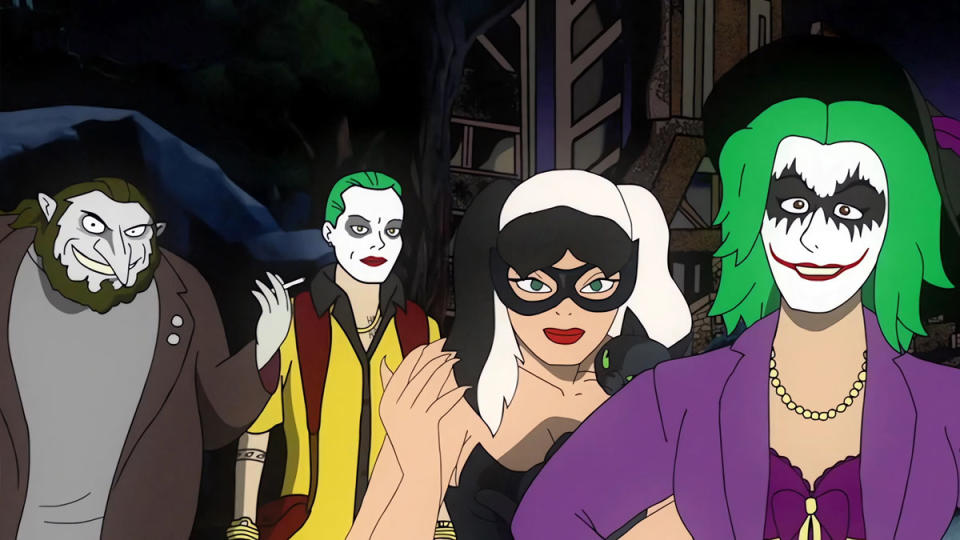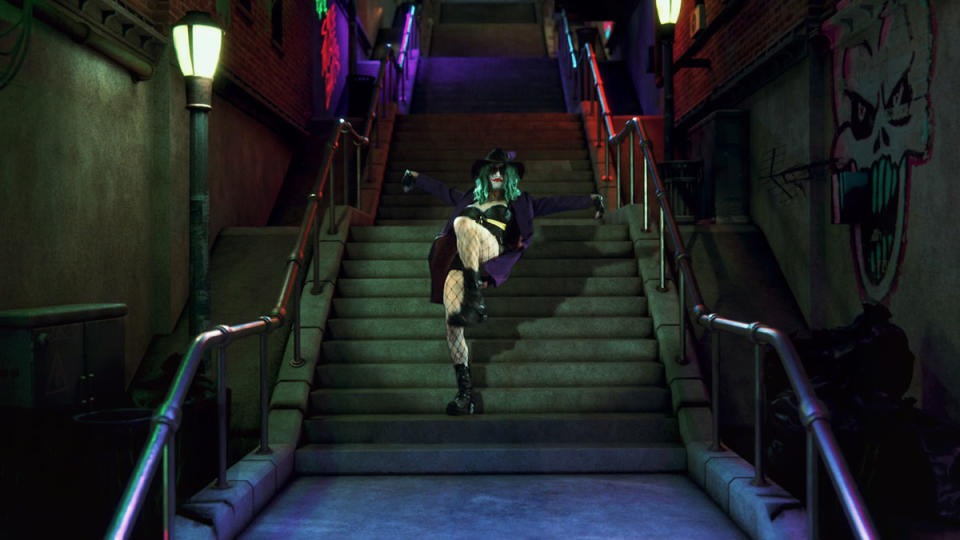The People’s Joker Is More than a Batman Parody — It’s About Toxic Comedy Culture
- Oops!Something went wrong.Please try again later.
- Oops!Something went wrong.Please try again later.
The post The People’s Joker Is More than a Batman Parody — It’s About Toxic Comedy Culture appeared first on Consequence.
The first time that most people heard about Vera Drew’s The People’s Joker was in September 2022, when the independently-produced dark comedy made its debut at the Toronto International Film Festival — until, that is, screenings were canceled after Drew received a letter from Warner Bros.
Now, though, her wild movie is coming to theaters, and Drew tells Consequence that “I’ve been using this press cycle with the movie to really go out of my way to talk about how and why it’s protected by parody law and fair use. Because it’s like The Naked Gun — it’s a parody film. That’s what we’re doing here, but we’re doing it in a way where there’s no precedent for it. So I understand why it’s edgy and a little weird for some people — because nobody’s ever taken their life and, and made a Joker parody with it. Only I could make this type of movie, with this perspective on these characters and this particular sort of alchemy to it.”
Specifically, Drew says, The People’s Joker is a story of her “processing a lot of really traumatic and horrible stuff I went through. The movie really is about coming out to a family that isn’t affirming of your gender identity, and the process of getting into a very codependent relationship.”
Plus, it’s a comedy, but it’s also a comedy about being a comedian, and how certain institutions in the comedy world have created a toxic environment. Drew says she began doing sketch comedy at the age of 13, performing in Second City shows as a teenager. “Comedy was always a space for me where I could, prior to coming out, really explore identity. Like, I never did standup in anything but drag. But it also kept me in this state of perpetual irony poisoning. Like, I think on some level, comedy for me was this high concept self-harm at times. So I really I needed to process all of that. And I don’t know that anybody would’ve ever wanted to watch a movie where I’m processing that without jokes.”
So there are a lot of great jokes in The People’s Joker, as the film’s heroine, living in an askew version of Batman’s world, hopes to join that universe’s version of Saturday Night Live — it’s called UCB Live in the film, but the creator is still known as Lorne Michaels.
This draws from Drew’s personal experience, and her perspective on comedy culture today. “I want to qualify everything I’m about to say with that there have definitely been many periods in my life where my dream was to be on SNL. That said…” she laughs, before continuing.
“I’ve always really thought SNL, more than anything, is like just an arm of our military-industrial complex. It’s a propaganda machine. It decides elections. I don’t know that we would’ve gotten two terms of George W. Bush if Will Ferrell didn’t have such a good impression of him. And it also really normalizes oppressors, like having Trump on there when he was running for President or bringing back Shane Gillis when he was fired from the show. To me, that show and Lorne Michaels, they really epitomize what the US political system is like.”
Also, adds Drew, “The idea of Lorne Michaels being the primary villain in a comic book movie is just funny to me. Particularly like our version of Lorne Michaels, which is like a CGI Pixar style version of him voiced by Maria Bamford.”
That wasn’t originally the case — in the TIFF cut of The People’s Joker, the character of Lorne Michaels was voiced by current SNL cast member Sarah Sherman, who pulled out of the film prior to its theatrical debut.
Drew says that the casting change is “a weird one for me to navigate, just because I respect [Sherman’s] decision to not be in the movie anymore — I mean, Lorne Michaels is her boss. I think when Sarah agreed to do the project, I don’t think she thought it was going to become what it became. Which, you know, on one level could hurt my ego, but at the same time, did I think it was going to become this? Like, I never could have imagined this, this movie having this level of exposure, let alone it premiering at TIFF.”
Continues Drew, “She was basically like, ‘Yeah, I can’t be a part of this ride anymore. I’m trying to stick around here for a few seasons.’ Thankfully, she gave me a little bit of money so that I could reopen up the mix and get a new voice in there.”
Casting Bamford “was actually [co-writer Bri LeRose]’s idea, because she worked on [the Maria Bamford Netflix comedy] Lady Dynamite. She was like, ‘We should ask Maria. I think she’d do it.’ And I don’t want to necessarily say Maria’s version is better, but it’s more of a character. It’s more fully three-dimensional.”
Plus, Drew says, “Maria’s been around a while. Bringing her into this, it’s like, is she going to be comfortable being in a film that talks about comedy this way? And I was shocked at how much what we were doing resonated with her. She totally got it immediately. She was totally on board to say all the lines we had written.”
The only line Bamford asked to change was an aside in which “Lorne” said that the show was bad. “Maria saw that line and she was like, ‘I’ll say this, but I don’t want to say that the show’s bad. Can I say that it’s uneven? Because that’s what I would actually say about it.’ And I was like, yes, absolutely. That’s a way better line anyway. And it’s a more accurate description, because SNL isn’t bad. Like, I haven’t watched it in years, but there’s good stuff on there sometimes.”

The People’s Joker (Altered Innocence)
For Drew, “There’s this mythic legendary quality to it, but it’s time to start taking the piss out of this stuff. I’ve seen some people react to the SNL stuff in a negative light, and I’m just like, ‘Why can’t I make fun of SNL?’ It’s a comedy show. We absolutely should be making fun of the show that killed Chris Farley.”
In addition, the comedy school known as UCB gets targeted, something once again drawn from Drew’s life. “When I moved to L.A. in 2012, I had about 10 years of experience doing sketch and improv, and everybody was doing UCB at that time, so I started taking classes.”
Says Drew, “I only got up to Level 3 because it was so expensive. That was my real issue with UCB — it was gate-kept really to people who could afford to spend over a thousand dollars per class. Like that’s crazy. It’s interesting that UCB’s theater in L.A. is right across the street from the Scientology Center. I won’t draw any conclusions there. But it always kind of just struck me as this pyramid scheme that also really dangles this carrot in front of you — like, ‘Stick with these classes and then you’ll get on the main cast and who knows, maybe then you’ll get to do a guest spot on, I don’t know, Tosh.0 or whatever the hell was on when I was out here.”
Drew credits her Level 3 instructor with telling her that while she was talented, she wasn’t “a UCB improviser — you’re too Joker-pilled for this theater.” “Joker-pilled” was not actually how Drew’s instructor put it, she clarifies: “He probably said, ‘You’re a little too edgy and weird for this place,’ which I’ll take.”
When it comes to comedy, Drew says, The People’s Joker is “really trying to discuss is why do we live in a world where people like Dave Chappelle are treated like these philosopher kings? Why are we letting shows like SNL help determine policy or who gets elected? It’s because comedy makes ideas more palatable, whether that is transphobia or neoconservatism or neoliberalism.”
Thus, Drew says, “I really wanted to explore comedy as being this esoteric philosophy thing, and on this mythic level too, because as a society, we don’t have this global religion — superheroes really are the closest thing we have to myth. And I think People’s Joker directly tackles that by really thoroughly grabbing both subjects and just strangling them for 92 minutes.”

The People’s Joker (Altered Innocence)
Drew crowdsourced help for much of the production, including the animation that makes up a good portion of the film’s action: “It was a lot of people who just were coming at it from a visual arts perspective. So most of the art in the film is made by people who aren’t filmmakers, per se, which is why I think the movie looks like no other movie ever made. It’s putting forward an aesthetic that I think you would never really see in film. And that process was super collaborative. This was always about bringing that whole collective of people together and finding a way to amplify all their voices.”
There’s so much packed into these 92 minutes, and should you watch it more than one time, Drew says to “pay attention to the Riddler, because there is an entire other movie happening behind the scenes with the Riddler that involves streaming platforms and company mergers.” She credits actor Trevor Drinkwater for writing up a whole backstory for his portrayal, so that “there’s this very rich story happening in the backgrounds.”
That’s just the beginning, though. “I think people are going to be discovering things in it long after I am dead and gone,” Drew says. “Just because it’s very dense. It was made obsessively. I gotta say I don’t recommend The People’s Joker as an archetype for making your first film. I mean that both from a legally-protecting-myself standpoint, but also, it’s unsustainable. I put everything I had into this movie and I would never be able to physically make a film like this again.”
The ending of The People’s Joker includes a tease of The People’s Nightmare (a Freddy Krueger-themed tale), which Drew confirms “is definitely going to happen. A lot of people think it is just a joke at the end of the movie, and it did start as a joke. But the second I wrote it down, I was like, oh my God. I have a full idea for The People’s Nightmare. It is a movie that I will make someday.”
However, Drew says, “I have a lot of stories I want to tell before then. The People’s Joker was really me processing my twenties and my early life and coming up in comedy and finding myself. So whatever The People’s Nightmare will be, I want to have a little bit more experience into my thirties and I want to be able to reflect on this next chapter of my life — where, hopefully, I get to tell a lot more stories using characters I own.”
The People’s Joker is in theaters now.
The People’s Joker Is More than a Batman Parody — It’s About Toxic Comedy Culture
Liz Shannon Miller
Popular Posts
A Perfect Circle, Primus, and Puscifer Kick Off "Sessanta Tour": Photos + Setlist
Conan O’Brien Returning to The Tonight Show for First Appearance in 14 Years
Maynard James Keenan on New Tool Album: "We Can’t Drag This Out Another 14 Years"
Mr. Bungle's Trevor Dunn Names 10 Albums That Influenced His Bass Playing

